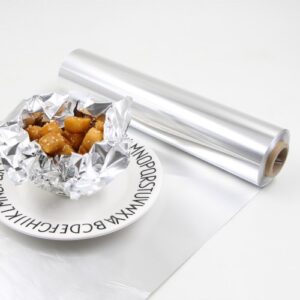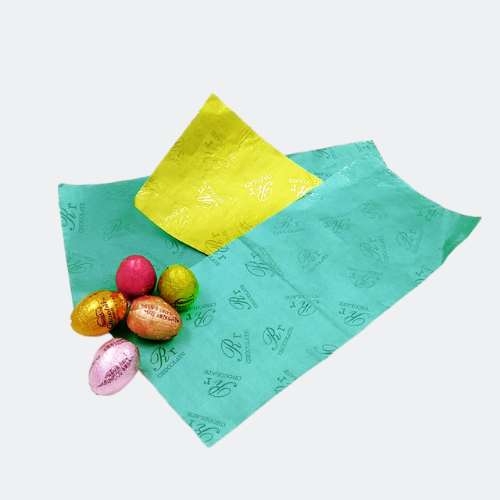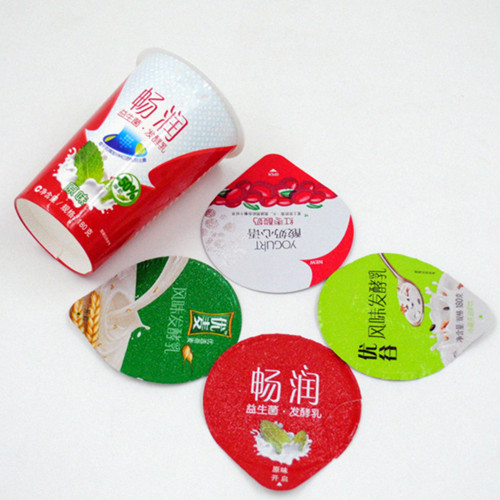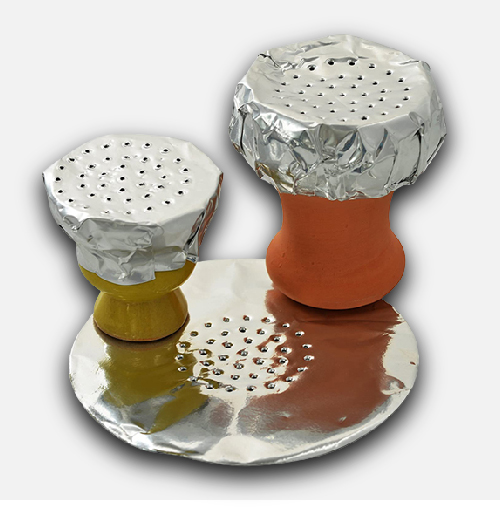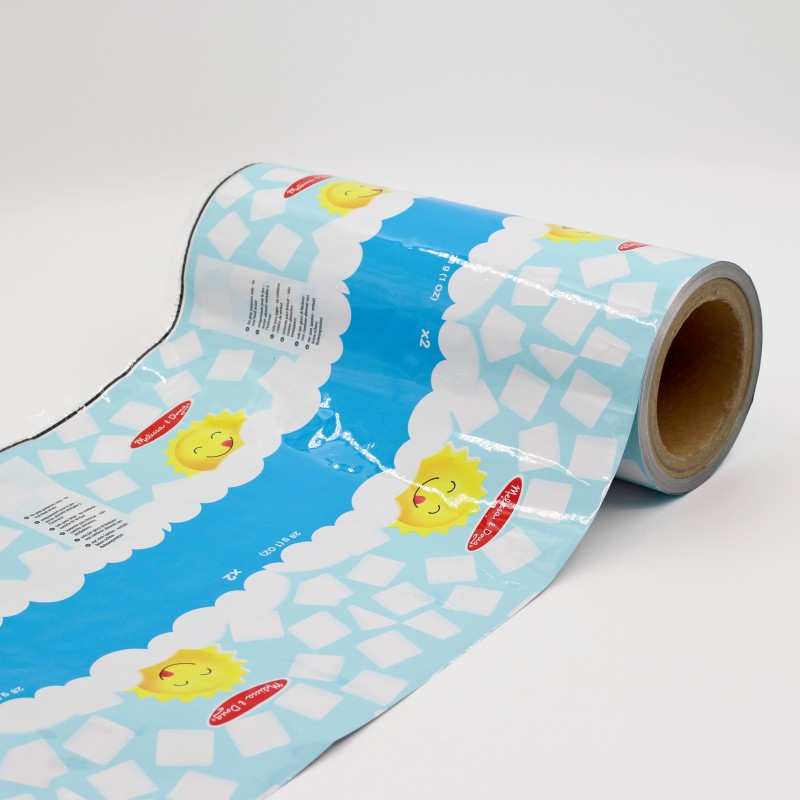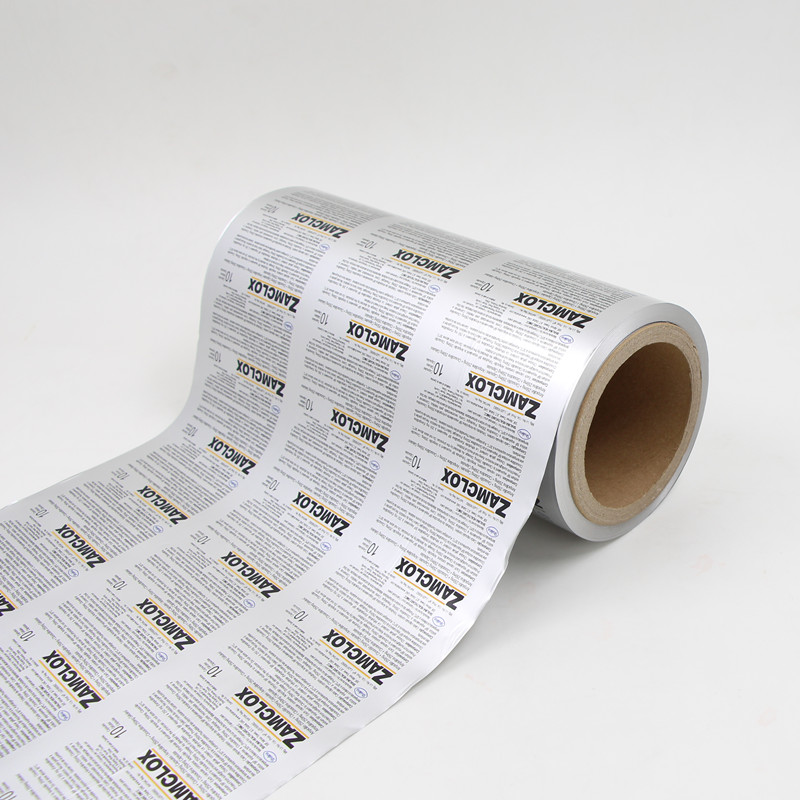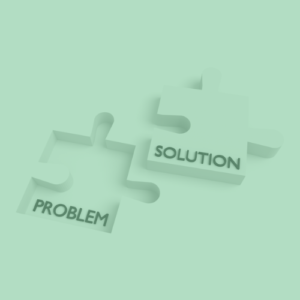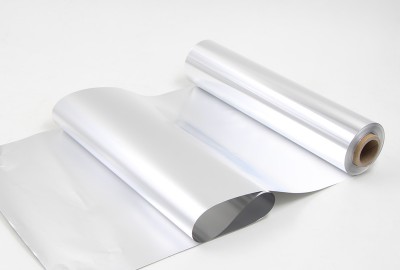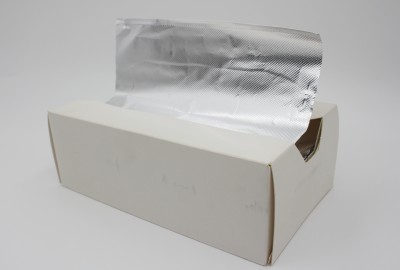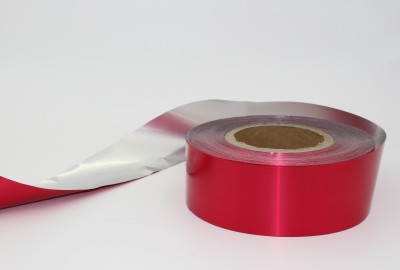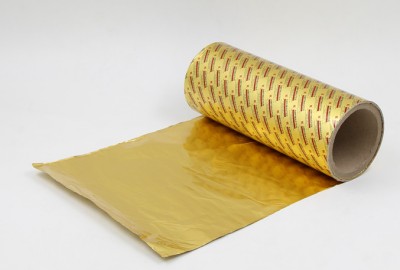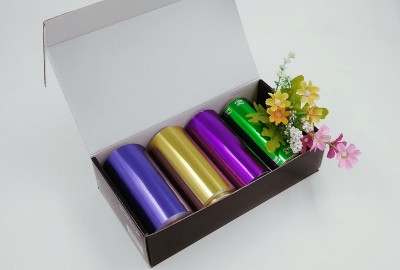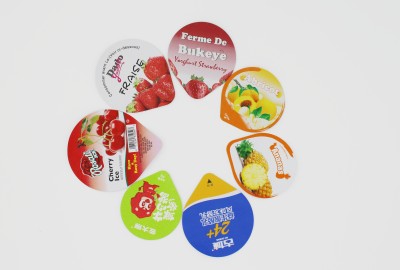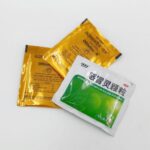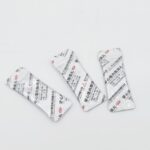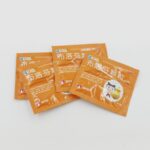Products
Aluminium foil used in our daily life
As we all know, aluminum foil printing and packaging products are widely used in our daily life. In the morning, you might want to start the day off with a cup of yogurt sealed with foil lid, have a burger wrapped with foil at noon to fuel your energy, and a nice hair highlights after work. On weekends, you can bake at home with foil containers and catering foils, or go out for picnics, and enjoy the snacks packed with aluminum lamination foils. When you sick, you may get the capsule from push-through pack with aluminium blister lidding foil. Aluminum foil not only brings all kinds of convenience to our life, but also protects our health.
Request a quote for more details?
About aluminium foil

History and development

Category and classification

Features and functions
History and development
Aluminum foil packaging began in the early 20th century, when it was as the most expensive packaging material, was only used for high-grade packaging. In 1911, Swiss confectionery companies began to use aluminum foil to wrap chocolate, gradually replacing tin foil in popularity. In 1913, on the basis of the success of aluminum smelting, the United States also began to produce aluminum foil, mainly for high-end goods, life saving supplies and chewing gum packaging. In 1921, the United States successfully developed composite foil board, mainly used as decorative board and advanced packaging folding carton.
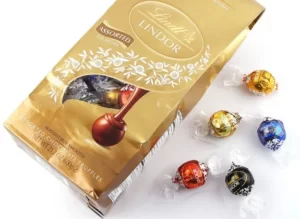
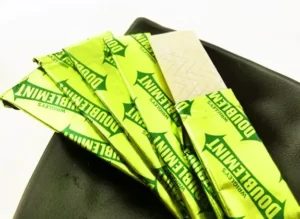
1938, heat-sealable aluminum foil was introduced. During World War II, it developed rapidly as a military packaging material. In 1948, food was packaged in molded foil containers.
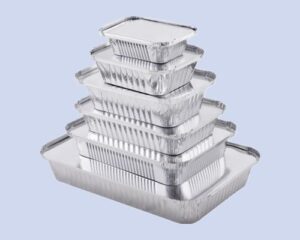
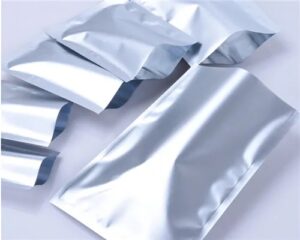
In the 1950s, aluminum paper and aluminum plastic composites began to develop. In the 1970s, with the maturity of color printing technology, aluminum foil and aluminum – plastic composite packaging entered a period of rapid popularity.
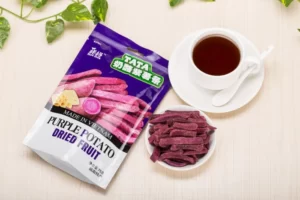
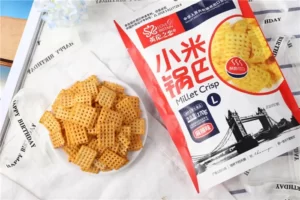
In the 21st century, the trend of market competition and product homogenization has stimulated the rapid development of product packaging.
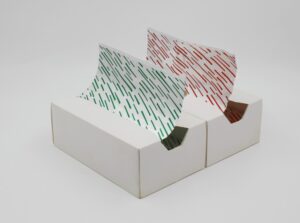
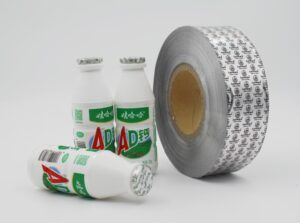
In 2002, the size of the global packaging market exceeded $500 billion. The development of aluminum foil packaging is basically synchronized with the development of the whole industry. The technology of aluminum plastic composite and aluminum paper composite is constantly mature, and the production cost is reduced, which promotes the popularization and application of aluminum matrix composite materials in the packaging market.
Category and classification
Because of its excellent characteristics, aluminum foil is widely used in food, beverage, cigarette, medicine, household daily necessities, etc., usually used as its packaging materials; Insulation materials for buildings, vehicles, ships, houses, etc.; It can also be used as decoration of gold and silver thread, wallpaper and all kinds of stationery, printed matter and decoration trademarks of light industrial products. Let’s take a look at the classifications of it.
Classification by thickness
Aluminum foil can be divided into thick foil, single zero foil and double zero foil.
- Thick foil: the thickness is 0.1 ~ 0.2mm foil.
- Single zero foil: the thickness is 0.01mm and less than 0.1mm/ foil.
- Double zero foil: double zero foil refers to the thickness of mm after the decimal point of two zero foil, usually less than 0.01.
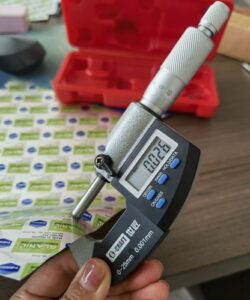
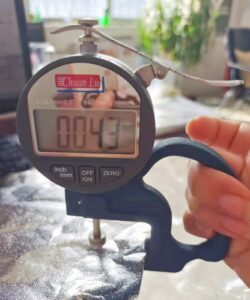
Classification by type and temper
Aluminum foil can be divided into roll type and sheet by shape. Most of the blank aluminum for deep processing is supplied in rolls, and only a few handicraft packaging occasions use sheet.
Aluminum foil can be divided into hard foil, semi-hard foil and soft foil by state.
- Hard foil: rolled without softening, not degreased, there is residue on the surface. Therefore, hard foils must be degreased before printing, laminating, and coating, and can be used directly if used for molding.
- Semi-hard foil: the hardness (or strength) of foil between hard foil and soft foil is usually used for molding.
- Soft foil: after rolling, the foil is completely annealed and soft, and the surface has no residual oil. Soft foils are used in most application areas such as packaging, composite materials, electrical materials, etc.
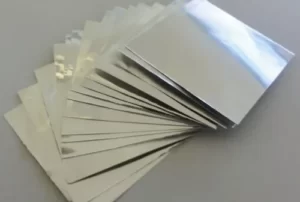
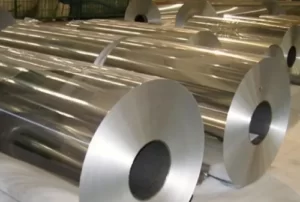
Classification by Surface state
Aluminum foil can be divided into single-sidedbright foil and double-sided bright foil.
- Single-sided bright foil: one side bright and one side dull after rolling. The thickness of single-sided brightt foil usually does not exceed 0.025mm.
- Double-sided bright foil: single-sheet rolled foil, both sides of the roll contact the two sides of the foil due to different roller surface roughness is divided into mirror double-sided bright foil and ordinary double-sided bright foil. The thickness of double-sided bright foil is generally not less than 0.01mm.
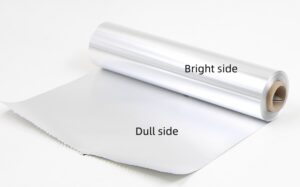
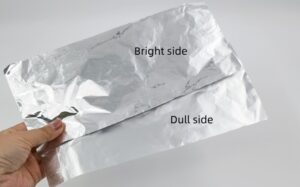
Classification by processing status
Aluminium foil can be divided into plain foil, embossed foil, composite foil, coated foil, colored foil and printed foil.
- Plain foil: foil without processing after rolling, also known as light foil.
- Embossed foil: foil with various patterns on the surface.
- Composite foil: foil and paper, plastic film, cardboard bonded into composite aluminum foil.
- Coating foil: foil coated with a variety of resin or paint.
- Colored foil: aluminum foil coated with color on the surface.
- Printing foil: the formation of a variety of patterns, patterns, text or pictures on the surface of the aluminum foil can be a color, up to 12 colors.
Features and functional
Mechanical
The mechanical properties of aluminum foil mainly include tensile strength, elongation, crack strength and so on. The mechanical properties are mainly determined by its thickness. The national standard GB/T3189-2003 “Aluminum and Aluminum Alloy Foil” has made corresponding provisions on the longitudinal mechanical properties.
In general, aluminum foil light weight, good ductility, thin thickness, small mass per unit area. However, the strength is low, easy to tear, easy to break and produce holes when folded, so it is generally not used for packaging products alone. In many cases, with other plastic film and paper composite, to overcome its shortcomings.
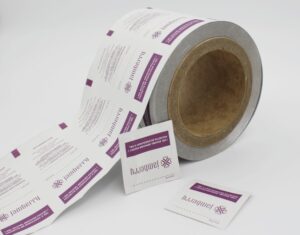
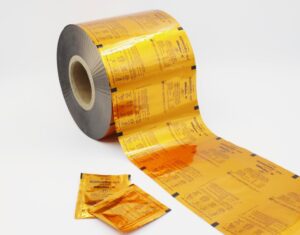
High barrier
Aluminum foil has high barrier to water, water vapor, light and fragrance, and is not affected by environment and temperature, so it is often used in fragrant packaging, moisture-proof packaging, etc., to prevent moisture absorption, oxidation and volatile deterioration of the packaging contents. It is especially suitable for high-temperature cooking and sterilization packaging of food.
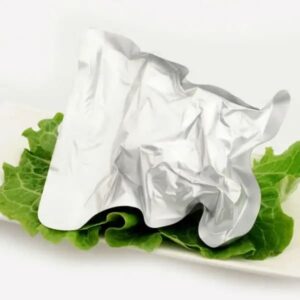
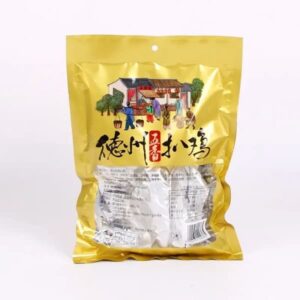
Corrosion resistance
The surface of aluminum foil naturally forms an oxide film, the formation of the oxide film can further prevent the continuation of oxidation, therefore, in the packaging content has a high acid or alkaline, often on the surface of the coating to protect the coating or coated PE, to improve its corrosion resistance.
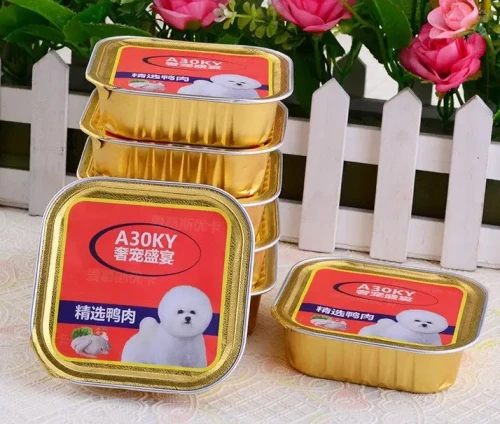
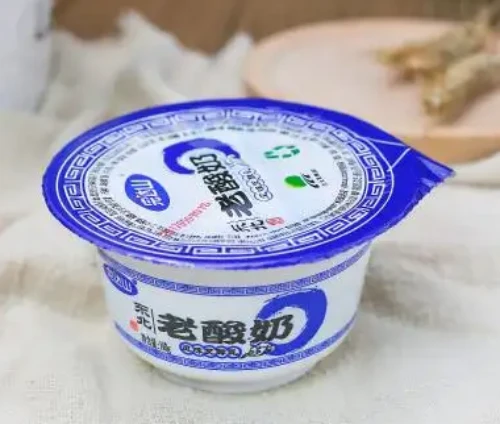
Heat and low temperature resistance
The high and low temperature state of aluminum foil is stable, it does not shrink or deformation from -73~371℃, at the same time has good thermal conductivity, which can reach 55%. So it can be used for high temperature cooking or other hot processing, and can be used for freezing packaging.
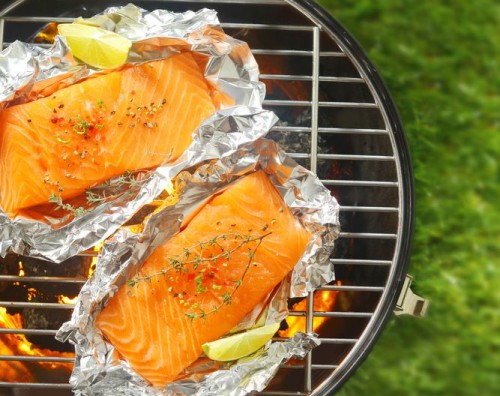
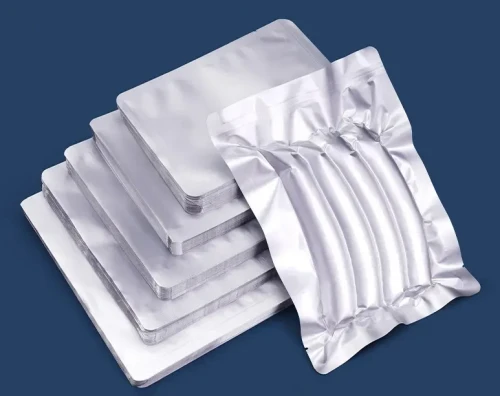
Shading
Aluminum foil has good shading, its reflective rate can be up to 95%, and the appearance of silver metallic luster, through surface printing decoration can show a good packaging decoration effect, therefore make it also a high-grade packaging material.
Want to know more?
Send us a message if you have any questions or request a quote. I will reply within 24 hours.
- +86 18906431372(WhatsApp/Wechat)
- [email protected]
If you do not mind, please do leave your phone number, because it is easier to get in touch with you.
If you do not receive my reply in time, please check the spam box, because sometimes my reply is there.
If your needs is urgent, please contact me directly on WeChat or Whatsapp.

